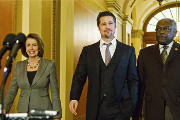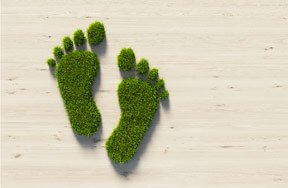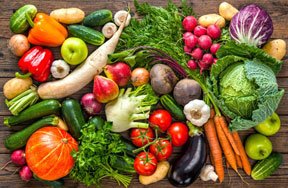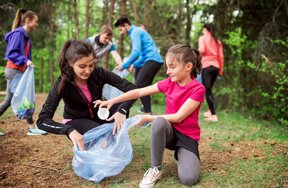Scientists report what we do has a direct impact on the future of our planet.
In the fall of 2018, the United Nations released a report from the Intergovernmental Panel on Climate Change. 91 scientists from 40 countries analyzed more than 6,000 scientific studies and determined that the earth’s climate is changing as a direct result of our behavior. The report also warns us that if we don’t make big changes today, life will become very challenging for everyone on the planet within your lifetime — by the year 2040, only 22 years away.
Even if you don’t believe the report warning that humans pose a threat to climate change, there are still many ways our actions have a direct impact on the state of the world today. Air, water, and land pollution are continuing to increase rapidly as the world’s population rises. Trash is piling up at an alarming rate and washing up on the shores, making it impossible to enjoy clean beaches. Plastic is breaking down in the oceans and leaching chemicals into the water. Animals are suffering from the impact of plastic invading their environment, from the sea turtle who had a straw stuck in its nose to birds covered in oil from oil spills in the ocean. Los Angeles experienced 87 straight days — almost three months — without a single day of clean air in the summer of 2018. Dirty air, also called smog, forms when chemicals from cars, factories, cleaning supplies, and even cow farts (more on that in a minute!) are released into the air. When sunlight hits these chemicals, they create particles that form ground-level ozone. The ozone layer high up in the atmosphere is the layer that keeps heat in and protects us from the sun’s more harmful rays. But ozone down on the ground can be harmful to our health, damaging our lungs, drying out our skin, and harming plants and animals.
How what we do affects the climate
The earth is wrapped in a protective, invisible bubble. Gases in the air trap and slow down heat to prevent it from leaking out into space. One of the main gases that holds the heat in is carbon dioxide, also known as CO2. Without CO2, the Earth would be so cold it wouldn’t be able to support life.
Too much CO2, however, can really heat things up. That’s where we are now. The concentration of CO2 is rising rapidly, and as a result, temperatures are climbing across the world. The carbon dioxide in the air acts a lot like the glass panels of a greenhouse, trapping heat in the atmosphere and causing temperatures to rise. Scientists are calling this the greenhouse effect. In small amounts, the greenhouse effect is a good thing. But when the layer of gas gets too thick due to pollution and emissions, the bad, toxic gases can’t escape, leading to global warming or climate change.
A Brief History of Climate Change
The Industrial Revolution, where production shifted from things being made by hand to things made in factories by machine, steam and chemical processes, took place from 1760 until 1840. The Second Industrial Revolution took manufacturing to a whole new level, with coal-burning trains, steamships, and advances in iron production. There was also a huge increase in pollution, as smoke and ash from the production process blackened the air and coated everything for miles around, even people’s lungs.
In 1896, Professor Svante Arrhenius proposed that what we do has a direct effect on climate change. He explained that increased human activity and industry increased the carbon dioxide in the atmosphere which ultimately led to changes in climate. If you’ve been following the news, you’ve probably heard that coral reefs are dying out and ice caps in polar regions are melting quickly. In extreme biomes like these, the delicate balance of food and water is upset, making the habitats for plants and animals unstable and unpredictable. As gases continue to increase over the next 25-30 years, scientists expect these shifts to affect more populated areas, and that means an even more direct impact on humans. In your lifetime, we have already seen the effects ofextreme flooding from hurricanes like Sandy, Katrina, Harvey, Irma, and Maria, extreme drought in dry areas, and extreme heat waves across the glob. Scientists predict that if things continue as they are, this is only the beginning.
What was that about cow farts?
14% of the world’s gas pollution comes from agriculture, and one of the biggest gas culprits is methane. The world's 1.5 billion cows and billions of other grazing animals emit dozens of polluting gases, including methane through belching (burping) and flatulence (farting). Scientists are working to change cows’ diets to see if that helps curb their methane production, but for now, some scientists believe that gaseous emissions from cows and other farm animals may be pushing even more toxic gas into the environment than cars.
What you can do to curb climate change (and save the planet)
With all this doom and gloom bad news, there is a light at the end of the tunnel — and no, it’s not an oncoming steam train coming to mow us all down. Reducing the amount of non-biodegradable trash we use, reducing our carbon footprint, replacing harmful chemicals and eliminating pesticide use can help reduce greenhouse gases. If every person on earth did just one thing to help the environment every day, we could change the course of climate change and preserve our planet for generations to come.
 There are many small ways you can make a big impactCourtesy of EPA.gov
There are many small ways you can make a big impactCourtesy of EPA.gov
Here are some ways you can help at home, at school, and in your community:
- Go meatless one day a week. Celebrating Meatless Mondays cuts down on meat consumption, which will eventually reduce the need for so much livestock and meat production. Cow farts begone!
- Upcycle: Save your Halloween candy wrappers and upcycle them into awesome crafts.
-
Take shorter showers:
- Reduce your trash: Challenge your friends to carry around the trash they produce for an entire day to see what their footprint is like every day and figure out how they can curb their daily waste in the future.
- Recycle paper: Wrap holiday presents and birthday gifts in recycled paper from magazines, newspapers, and grocery bags.
- Carry canvas: Bring a pocket-sized reusable tote bag wherever you go so you don’t need to use disposable bags wherever you shop, including clothing stores, fast-food places, and the grocery store.
- Plant something: Plant a tree, flower, or garden to help offset greenhouse gas emissions and the effects of deforestation.
- Turn down the heat: Set your thermostat to 68 degrees in winter and 72 degrees in summer to reduce the amount of power your family uses to control the climate in your house. It not only saves energy, it also saves money!
- Go reusable: Disposable plastic and styrofoam cups, plates, bags trays and packaging make up the bulk of trash that doesn’t have any place to go when you’re done using it. Instead of using plastic, which is a petroleum-based product made from oil and natural gas that releases pollutions into the atmosphere and doesn’t break down naturally, wrap your sandwiches in reusable cloth, wax paper, a bento box, or bamboo-based paper, carry a reusable water bottle, and tote your lunch in reusable, non-plastic containers.
- “Just say no”: to unnecessary disposable packaging to reduce your trash production.
- Petition your school to make the cafeteria more eco-friendly.
- Educate your fellow students about climate change by starting a club, making posters, or starting a campaign like a walking school bus, zero waste day (or month) challenge, or join a corporate challenge like the PepsiCo recycling challenge that offers resources to students, teachers, and communities to eliminate barriers to participation and help make a difference.
Tell us what you think!
What will you pledge to help eliminate pollution and make the air and land cleaner for future generations? Share your story here!

































